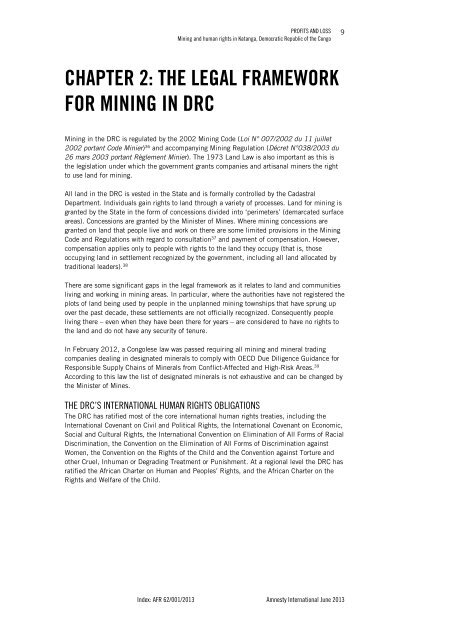Download - Amnesty International Canada
Download - Amnesty International Canada
Download - Amnesty International Canada
Create successful ePaper yourself
Turn your PDF publications into a flip-book with our unique Google optimized e-Paper software.
PROFITS AND LOSS<br />
Mining and human rights in Katanga, Democratic Republic of the Congo<br />
CHAPTER 2: THE LEGAL FRAMEWORK<br />
FOR MINING IN DRC<br />
Mining in the DRC is regulated by the 2002 Mining Code (Loi N° 007/2002 du 11 juillet<br />
2002 portant Code Minier) 36 and accompanying Mining Regulation (Décret N°038/2003 du<br />
26 mars 2003 portant Règlement Minier). The 1973 Land Law is also important as this is<br />
the legislation under which the government grants companies and artisanal miners the right<br />
to use land for mining.<br />
All land in the DRC is vested in the State and is formally controlled by the Cadastral<br />
Department. Individuals gain rights to land through a variety of processes. Land for mining is<br />
granted by the State in the form of concessions divided into ‘perimeters’ (demarcated surface<br />
areas). Concessions are granted by the Minister of Mines. Where mining concessions are<br />
granted on land that people live and work on there are some limited provisions in the Mining<br />
Code and Regulations with regard to consultation 37 and payment of compensation. However,<br />
compensation applies only to people with rights to the land they occupy (that is, those<br />
occupying land in settlement recognized by the government, including all land allocated by<br />
traditional leaders). 38<br />
There are some significant gaps in the legal framework as it relates to land and communities<br />
living and working in mining areas. In particular, where the authorities have not registered the<br />
plots of land being used by people in the unplanned mining townships that have sprung up<br />
over the past decade, these settlements are not officially recognized. Consequently people<br />
living there – even when they have been there for years – are considered to have no rights to<br />
the land and do not have any security of tenure.<br />
In February 2012, a Congolese law was passed requiring all mining and mineral trading<br />
companies dealing in designated minerals to comply with OECD Due Diligence Guidance for<br />
Responsible Supply Chains of Minerals from Conflict-Affected and High-Risk Areas. 39<br />
According to this law the list of designated minerals is not exhaustive and can be changed by<br />
the Minister of Mines.<br />
THE DRC’S INTERNATIONAL HUMAN RIGHTS OBLIGATIONS<br />
The DRC has ratified most of the core international human rights treaties, including the<br />
<strong>International</strong> Covenant on Civil and Political Rights, the <strong>International</strong> Covenant on Economic,<br />
Social and Cultural Rights, the <strong>International</strong> Convention on Elimination of All Forms of Racial<br />
Discrimination, the Convention on the Elimination of All Forms of Discrimination against<br />
Women, the Convention on the Rights of the Child and the Convention against Torture and<br />
other Cruel, Inhuman or Degrading Treatment or Punishment. At a regional level the DRC has<br />
ratified the African Charter on Human and Peoples’ Rights, and the African Charter on the<br />
Rights and Welfare of the Child.<br />
Index: AFR 62/001/2013 <strong>Amnesty</strong> <strong>International</strong> June 2013<br />
9


